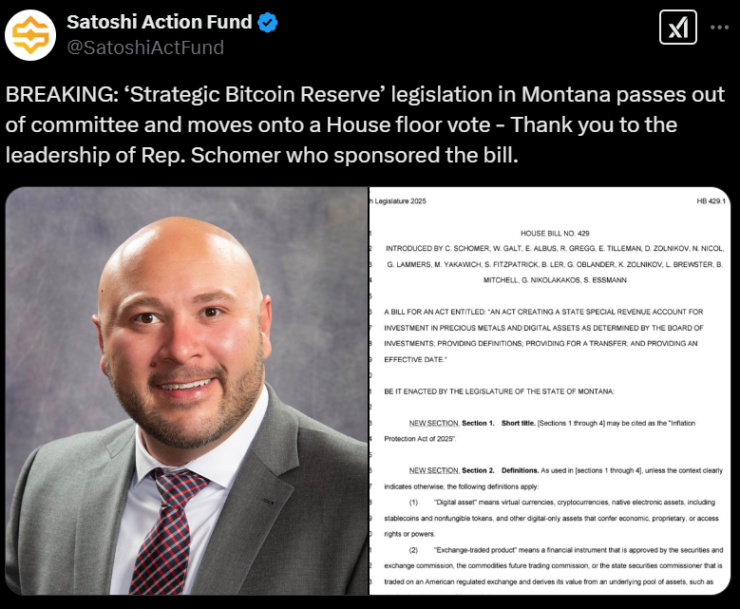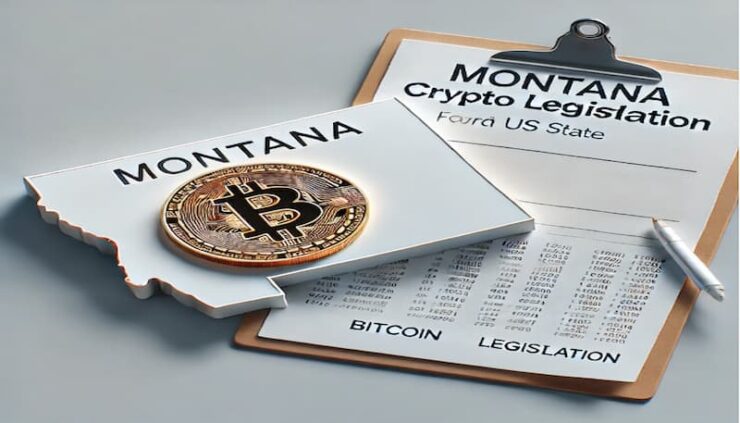Montana is moving closer to recognizing Bitcoin as a legitimate reserve asset, following the passage of House Bill No. 429 by the House Business and Labor Committee in a 12-8 vote on February 19.
With this step, Montana joins Utah, Arizona, and Oklahoma as one of only four U.S. states to have advanced legislation focused on state-backed Bitcoin reserves. If passed, this bill could allow Montana to allocate up to $50 million in public funds into Bitcoin, stablecoins, and precious metals, a move that reflects the growing influence of digital assets in state financial policies.

Bitcoin as a State Reserve: What Montana’s Bill Proposes
The bill, which now moves to Montana’s House for further approval, seeks to:
- Establish a special revenue account that would allow the state to invest in precious metals, stablecoins, and digital assets.
- Limit eligible digital assets to those with a market cap above $750 billion over the last calendar year. Currently, Bitcoin is the only asset that qualifies.
- Allow the state treasurer to transfer up to $50 million into this investment account by July 15, 2025, if the bill is enacted.
A significant amendment to the bill removed the requirement that these reserves be held by a qualified custodian or through an exchange-traded fund (ETF). This opens the door for Montana to hold Bitcoin directly, rather than through an institutional financial intermediary.
If approved, the bill would take effect on July 1, 2025, making Montana one of the first U.S. states to officially integrate Bitcoin into its financial reserves.
Why Is Montana Taking This Step?
Montana has long been considered a pro-crypto state, thanks to its energy-rich environment and business-friendly regulations that have attracted Bitcoin miners and blockchain firms. With growing concerns over inflation and monetary stability, proponents of the bill argue that Bitcoin’s scarcity and decentralized nature make it a hedge against financial instability, much like gold.
The bill’s passage in committee came along partisan lines, with Republicans voting in favor and Democrats opposing. Supporters believe it could position Montana as a leader in financial innovation, while critics have raised concerns over volatility, regulatory uncertainty, and risk to public funds.
Montana Joins a Growing Trend of State-Level Bitcoin Legislation
Montana is not alone in considering Bitcoin-backed reserves. The trend is gaining traction across multiple U.S. states:
- Utah has made the most progress, being the only state where a Bitcoin reserve bill has already passed through the House.
- Arizona and Oklahoma have also introduced legislation to explore the inclusion of Bitcoin in state reserves.
- Ten additional states, including Illinois, Kentucky, Maryland, New Hampshire, New Mexico, North Dakota, Ohio, Pennsylvania, South Dakota, and Texas, have proposed similar legislation.
On the federal level, Senator Cynthia Lummis continues to advocate for a nationwide Bitcoin reserve bill, though progress in Congress remains slow due to regulatory uncertainty and political division.
How Could This Impact Bitcoin Adoption?
If Montana’s bill is signed into law, it could set a major precedent for other states, showing that Bitcoin can be treated as a legitimate financial asset at the government level.
The implications could be significant:
- Legitimization of Bitcoin in mainstream finance – If a U.S. state holds Bitcoin, it could encourage more institutional adoption and reinforce its status as a store of value.
- Further state-level Bitcoin policies – Success in Montana may inspire other states to fast-track their own legislation, leading to a broader movement toward Bitcoin-backed reserves.
- Potential federal response – If multiple states begin integrating Bitcoin into public reserves, Congress may be pressured to define a clearer federal stance on how governments can handle digital assets.
What Happens Next?
The next major step is for Montana’s House to debate and vote on the bill. If approved, it will then head to the state Senate and governor’s office for final approval.
While Utah remains the frontrunner in passing a Bitcoin reserve bill, Montana’s push adds momentum to a growing trend of states embracing digital assets. Whether this marks the beginning of a broader shift in U.S. state financial policies or remains a symbolic experiment will depend on how these legislative efforts unfold.
For now, all eyes are on Montana, as the state inches closer to bringing Bitcoin into its treasury, a move that could reshape how governments think about digital assets in the long run.





